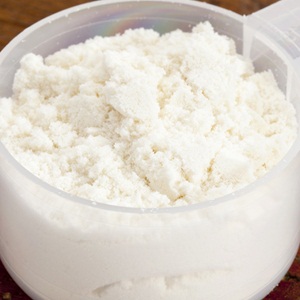
As science continues to support the role of protein in building and maintaining lean muscle, maintaining weight and aging healthy, consumers are embracing the important role of protein in the diet. But not all proteins are created equal and it turns out that protein quality really does matter.
The latest on the topic of protein quality will be presented during March 2015 at SupplySide West, the leading destination for the exploration, discovery, innovation and market strategy that fuels the healthier marketplace. Nutrition and exercise physiology expert Chris Mohr, PhD, RD, will share emerging research on the role of dairy proteins, specifically whey protein, in the diet with suppliers and buyers that drive the dietary supplement, food, and beverage marketplace. The educational session, sponsored by US Dairy Export Council Global Marketing, titled "Protein Quality: It Matters", will highlight the advantages of whey protein over other protein types in terms of functionality, flavor and nutrition as food and beverage formulators consider ways to incorporate this important nutrient into novel products.
"While the recommended daily intake of protein averages about 50 grams/day for an adult (0.8g/kg body weight), this is the minimum amount needed to avoid a deficiency. To optimize the benefits of protein I recommend that adults take in about 90 gram/day and more active adults should get approximately 120 g/day." explained Dr Mohr. "In addition to quantity, it's important for people to consider the quality of their protein source, as it varies."
Recommended method
One recommended method to assess the quality of different proteins is the Digestible Indispensable Amino Acid Score (DIAAS)1. DIAAS is a relatively new protein quality scoring method that corrects for limitations inherent to the current protein quality calculation method and demonstrates the higher bioavailability and quality of dairy proteins, including whey protein, when compared with plant-based sources. Based on a 2012 Food and Agricultural Organisation (FAO) committee report, high-quality proteins from milk, whey and other dairy products are estimated to score 30% higher under the DIAAS system compared with protein quality scores calculated from the currently utilised Protein Digestibility Corrected Amino Acid Score (PDCAAS) system. This new scoring method further strengthens the growing body of research that supports the superior advantages of whey protein in terms of functionality, flavour and nutrition for food and beverage formulators to incorporate into novel products.
Whey protein is a high-quality, complete protein containing all of the essential amino acids ("building blocks") that are naturally found in dairy. It is also one of the best sources of branched-chain amino acids (BCAA) including leucine, an amino acid associated with stimulation of muscle protein synthesis.
Benefits of whey protein
During his presentation, Dr Mohr will highlight this research and discuss the many benefits of whey protein including:
- Maintain a healthy weight: A reduced calorie, higher protein diet including whey protein may improve the quality of weight loss by helping a person lose more fat and/or maintain more lean muscle.
- Curb hunger: Calorie for calorie, whey protein can help people feel fuller longer than carbohydrates or fats.
- Get lean: Consuming whey protein and performing resistance exercise regularly can help build more lean muscle than resistance training alone or resistance training combined with carbohydrate consumption.
- Enhance exercise recovery: Consuming whey protein after exercise helps to build and repair muscle.
- Reduce muscle loss with ageing: Emerging research shows older Americans may be able to slow the age-related decline of muscle mass by engaging in resistance training and consuming higher than the Recommended Dietary Allowance (RDA) for protein.
Whey protein awareness
Additional research on the effects of whey protein is underway in cooperation with the Whey Protein Research Consortium (the Consortium), an international partnership of dairy cooperatives, associations, processors and multinational companies working together to grow the market for whey protein. The mission of the Consortium is to create incremental global usage of whey proteins through the development and documentation of whey protein's health and wellness benefits. The goal of the integrated research efforts of the Consortium is to develop a generic, non-proprietary body of knowledge, establishing measurable health and wellness benefits of whey proteins that will create a scientific foundation for new marketing opportunities through the development of scientific support for health, qualified health, and/or structure function claims.
Read more:
The best time to take creatine
What is whey protein?
Soy and whey build muscle equally




 Publications
Publications
 Partners
Partners














